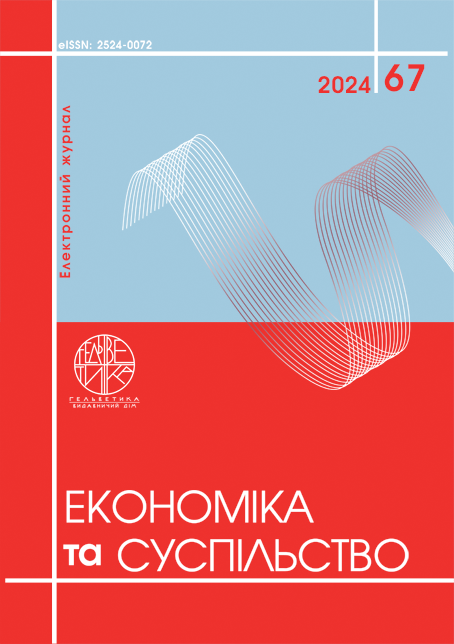КАТЕГОРІЯ «ІНФОРМАЦІЙНА ЕКОНОМІКА» В СИСТЕМІ ЗНАНЬ ПРОГНОЗУВАННЯ ТА СЦЕНАРУВАННЯ РОЗВИТКУ МІСТ
Анотація
Статтю присвячено дослідженню поняття «інформаційна економіка» в системі знань прогнозування та сценарування розвитку міст. Визнано та доведено, що наступила цифрова епоха з цілісним баченням змін в усьому різноманітті та наповнені управлінських практик з залученням новітніх знань, інновацій та формуванням інформаційної економіки. Наведено трактування терміну «інформаційна економіка», його особливості та методологічні надбання в перспективах впровадження в технологіях прогнозування та сценарування з точки зору різних науковців та інституцій. Сформовано низку принципів залучення категорії «інформаційна економіка» в практичну діяльність регіонального менеджменту з позиції покращення процесу планування та прогнозування, моделювання та сценарування розвитку міст України. Визначено значення категорії «інформаційна економіка» в системі знань менеджменту і особливо прогнозування та сценарування розвитку міст в різних напрямах.
Посилання
Фінагіна О.В., Буряк Є.В. Розвиток системи знань українського менеджменту в умовах інформаційно-інтелектуального прогресу. Сучасні теорія і практика менеджменту та бізнес-адміністрування : Збірник тез доповідей VII Всеукраїнської науково-практичної конференції (м. Черкаси, 20 квітня 2023 р.). Черкаси : Черкаський державний технологічний університет. Видавець Пономаренко Р.В., 2023. 96 с.
Зінченко О. А., Даріюш П., Зінченко Д. С. Інформаційна економіка: концепція, сутність та розвиток. Економічний вісник НТУУ «КПІ» : збірник наукових праць. 2019. № 16. С. 3–13.
Information Economy Report (Series) // United nations conference on trade and development. URL: https://unctad.org/en/Pages/Publications/InformationEconomyReportSeries.aspx
Castells Manuel. The rise of the network society / Manuel Castells. – [2-nd ed.]. – (Information age ; V. 1), 2000. – 594 p.
Cambridge Business English Dictionary© Cambridge University Press). URL: https://dictionary.cambridge.org
Чала О.В. Сутнісні аспекти інформаційної економіки. Вісник економіки транспорту та промисловості. 2012. № 40. С. 76–79.
Шкарлет С.М. Інформаційна економіка як основа соціально-економічної регенерації України. Економіка України. 2014. № 11. С. 51–60. URL: http://nbuv.gov.ua/UJRN/EkUk_2014_11_6
Геєць В.М. Пріоритети національного економічного розвитку в контексті глобалізаційних викликів : монографія. Київ : Київ. нац. торг.-екон. ун-т, 2008.
На шляху до суспільства знань: всесвітня доповідь ЮНЕСКО. URL: https://unesdoc.unesco.org/ark:/48223/pf0000141843_ukr
Фінагіна О.В., Бітюк І.М., Матвієнко О.Д., Гудима Д.М. Принципи розвитку українського освітнього простору в умовах інформаційної економіки: креативні підходи та європейський досвід. Збірник наукових праць Черкаського державного технологічного університету. Серія: Економічні науки. 2022. Випуск 65. С. 16–24.
Finahina O.V., Buriak Ye.V. (2023). Rozvytok systemy znan ukrainskoho menedzhmentu v umovakh informatsiino-intelektualnoho prohresu. Suchasni teoriia i praktyka menedzhmentu ta biznes-administruvannia: Zbirnyk tez dopovidei VII Vseukrainskoi naukovo-praktychnoi konferentsii (m. Cherkasy,20 kvitnia 2023 r.). Cherkasy, Cherkaskyi derzhavnyi tekhnolohichnyi universytet. Vydavets Ponomarenko R.V., 96 s.
Zinchenko O.A., Dariiush P., Zinchenko D.S. (2019). Informatsiina ekonomika: kontseptsiia, sutnist ta rozvytok. Ekonomichnyi visnyk NTUU «KPI» : zbirnyk naukovykh prats. № 16. S. 3–13.
Information Economy Report (Series) // United nations conference on trade and development. URL: https://unctad.org/en/Pages/Publications/InformationEconomyReportSeries.aspx.
Castells Manuel. The rise of the network society / Manuel Castells. – [2-nd ed.]. – (Information age ; V. 1), 2000. – 594 p.
Cambridge Business English Dictionary© Cambridge University Press). URL: https://dictionary.cambridge.org
Chala O.V. (2012). Sutnisni aspekty informatsiinoi ekonomiky. Visnyk ekonomiky transportu ta promyslovosti. № 40. S. 76–79.
Shkarlet S.M. (2014). Informatsiina ekonomika yak osnova sotsialno-ekonomichnoi reheneratsii Ukrainy. Ekonomika Ukrainy. № 11. S. 51–60. URL: http://nbuv.gov.ua/UJRN/EkUk_2014_11_6
Heiets V.M. (2008). Priorytety natsionalnoho ekonomichnoho rozvytku v konteksti hlobalizatsiinykh vyklykiv: monohrafiia. Kyiv: Kyiv. nats. torh.-ekon. un-t.
Na shliakhu do suspilstva znan: vsesvitnia dopovid YuNESKO. URL: https://unesdoc.unesco.org/ark:/48223/pf0000141843_ukr
Finahina O.V., Bitiuk I.M., Matviienko O.D., Hudyma D.M. (2022). Pryntsypy rozvytku ukrainskoho osvitnoho prostoru v umovakh informatsiinoi ekonomiky: kreatyvni pidkhody ta yevropeiskyi dosvid. Zbirnyk naukovykh prats Cherkaskoho derzhavnoho tekhnolohichnoho universytetu. Seriia: Ekonomichni nauky. Vypusk 65. S. 16–24.

Ця робота ліцензується відповідно до Creative Commons Attribution 4.0 International License.


